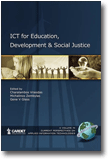
ICT for Education, Development, and Social Justice
Edited by:
Charalambos Vrasidas, Centre for the Advancement of Research & Development in Educational Technology
Michalinos Zembylas, Intercollege, Cyprus and Michigan State University
Gene V Glass, Arizona State University
A volume in the series: Current Perspectives on Applied Information Technologies. Editor(s): Gene V Glass, Arizona State University. Charalambos Vrasidas, Centre for the Advancement of Research & Development in Educational Technology.
Published 2009
This volume provides examples of current developments on the role of ICT for education, development, and social justice within an international context. Chapters draw on advanced contemporary thinking from scholars and practitioners in the field to present case studies of how ICT can be used to promote sustainable development and social justice. Social justice is understood in a wide sense as the pursuit of democracy, justice and development in the struggle against any form of oppression; it is within this context that ICT is explored as a tool for social change.
The objectives of this book are:
- To analyze the philosophical, historical, political, and cultural backgrounds and contexts that are constitutive of contemporary challenges and tensions
in the role of ICT for education, development, and social justice around the world;
- To appreciate the contextual and international dimensions of the tensions and challenges faced by educators around the world and contribute to ongoing
efforts to sketch a vision for addressing their needs;
- To explore ways in which ICT in education can promote social justice and contribute toward sustaining communities around the world
CONTENTS
CONTENTS: PART 1: OVERVIEW. ICT for Development: Challenges and Possibilities, Charalambos Vrasidas, Michalinos Zem-bylas, and Gene V Glass. ICT for Education, Development, and Social Justice: Some Theoretical Issues, Michalinos Zembylas. PART 2: ICT FOR DEVELOPMENT. E-Hopes and Public Education in Latin America, Gustavo E. Fischman and José Luis Ramírez Romero. The Expansion of Higher Education in the Developing World: The Contribution of Distance Education, Sir John Daniel. Role of ICT in Bridging The Digital Divide in a High-Poverty School District, Amy S. C. Leh, Lee Grafton, and Sylvester Robertson. Is There a Role for Information and Communications Technologies in the Education and Development of Disadvantaged Rural Communities? Tom Power, Kimberley Porteus, Brian Ramadiro, Nomakholwa Tshume, Shumi Makalema, and Rhodri Thomas. Open Resources for Sustainable Education, Marina Stock McIsaac and António Moreira. PART 3: ICT FOR INCLUSION. Mobile Technologies: Current Practices, Future Possibilities, Tom Power and James Sankale. The Digital Divide in Disability and Education, Jason Brent Ellis, Carla Abreu-Ellis, and Amber Ricker. School–Community ICT-Mediated Linkages: The Southeast Asian Experience, Cher Ping Lim and John Hedberg. PART 4: ICT FOR CULTURAL UNDER-STANDINGS. Online Gaming: Building Bridges that Enhance Cultural Understandings, Mary A. Kayler, Debra Sprague, and Chris Dede. Computer-Supported Collaborative Inter-cultural Education: Creating Bridges for Palestinians and Jews in Conflict, Zvi Bekerman and Gabriel Horenczyk. ICT for Peace and Reconciliation: Constraints and Possibilities in Cam-bodia and Tibet, Edward J. Brantmeier and Jayson W. Richardson. Social Networking Applications, Social Justice, and Multicultural Understanding, Carrie O’Connor and Rebecca Skulnick.
REVIEWS
"This book achieves its purpose and aims and is essential reading for those interested in advancing the study of ICTs beyond a narrow technoscientific view that privileges technology and science over social concerns. Its scope provides readers with insights into the use of ICTs to support education for development and social justice on a global scale. These insights are useful to a broader, inclusive scientific community as it rethinks how and by whom science is done and communicated and for whose and what purpose in the globalized 21st century." Elsie Szecsy Arizona State University in Education Review (Read full review)
"This book's central and critical premise, namely that we have now to analyze critically how information and communication technologies can be better used to promote development and social justice, makes it especially timely now that the computer can be said to be part of a global system." John Willinsky Stanford University
-
Paperback978-1-60752-021-4
Web price: $45.04 (Reg. 52.99)
-
Hardcover978-1-60752-022-1
Web price: $80.74 (Reg. 94.99)
- eBook9781607528821

- EDU001000 - EDUCATION: ADMINISTRATION: General
- EDU015000 - EDUCATION: Higher
- EDU037000 - EDUCATION: Research
-
 Distance Education and Distributed Learning
Distance Education and Distributed Learning
-
 Institutional Diversity in American Postsecondary Education
Institutional Diversity in American Postsecondary Education
-
 Mobile Makes Learning Free
Building Conceptual, Professional and School Capacity
Mobile Makes Learning Free
Building Conceptual, Professional and School Capacity
-
 Online Professional Development for Teachers
Online Professional Development for Teachers
-
 Preparing Teachers to Teach with Technology
Preparing Teachers to Teach with Technology
-
 Promoting Equitable Classroom Practices in Higher Education
Approaches Beyond Curriculum
Promoting Equitable Classroom Practices in Higher Education
Approaches Beyond Curriculum
-
 The Handbook for Aspiring Higher Education Leaders
The Handbook for Aspiring Higher Education Leaders

